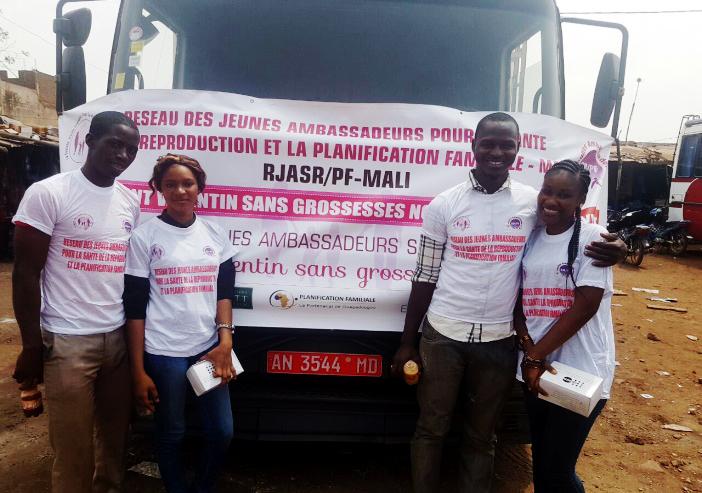Where We Work
See our interactive map


The Reproductive Health and Family Planning Youth Ambassadors are a group of dedicated and engaged youth advocates who educate, counsel, and motivate their peers to adopt healthy sexual behaviors. Photo by Moctar Diallo courtesy of IntraHealth International.
Young advocates in Mali spread information about family planning and reproductive health services.
In Mali, young girls face the prospect of unwanted or adolescent pregnancies that can lead to unsafe abortions and other health risks. The most recent Demographic Health Survey indicated that early pregnancy increases the risk of death among adolescents. Further, pregnancy considerably reduces a young woman’s chances of continuing her studies and puts her at risk of sexually transmitted infections such as HIV/AIDS. In fact, young women are three times as likely as young men to become infected with HIV.
The need for modern contraceptives is clear, and so is the desire. Currently, 14.5% of girls aged 15-19 years and 21.3% of women aged 20-25 years want to avoid pregnancy but are not using modern contraceptives.
The Youth Ambassadors of Mali sounded the alarm through our Valentine’s Day without Unwanted Pregnancy campaign. Holding this campaign on a holiday celebrating love and romance was not coincidental. Young couples are at risk of engaging in risky sexual behavior, the effects of which stand to last well past the holiday.
My fellow youth ambassadors and I talked to a total of 1,674 youth over the course of the campaign. Of these, over 1,000 young people benefitted from free reproductive health services.
The Reproductive Health and Family Planning Youth Ambassadors are a group of dedicated and engaged youth advocates who educate, counsel, and motivate our peers to adopt healthy sexual behaviors. As members of our country’s coalition of family planning civil society organizations, we work with coalition members to develop an annual workplan and advocacy objectives. We act as advocates for our peers to ensure that our generation’s voices are heard in important conversations that stand to impact our future.
This year, we teamed up to promote healthy and responsible sexual behaviors among our peers through educational chats, home visits, and condom distribution. Our activities targeted out-of-school youth, such as roving saleswomen, bus drivers, driver apprentices, and other youth working in the informal sector. Out-of-school youth are particularly vulnerable as they lack the information, including knowledge of how and where to access reproductive health and family planning services, that their in-school peers often have.
We held this year’s campaign in the three main bus terminals in the capital city of Bamako (Médine, Sogoniko, and Sebenicoro) and in Mali’s National Park, a popular spot for romantic meetups. We referred youth interested in finding out more or in choosing a family planning method to mobile clinics offering free reproductive health and family planning services. The clinics provided counseling, treatment for sexually transmitted infections, and HIV and pregnancy tests.
Several young women who sold goods in the bus terminals praised this initiative, and upon hearing of the dangers of early or unwanted pregnancy, didn’t hesitate to ask for condoms. The boldest among them even talked to their friends about what they had learned and advised them to seek services in nearby health centers.
As young people ourselves, we know that to reach our peers we need to find creative ways to spread our messages.
The objective of our campaign was to attract attention to the real risks associated with unprotected sex and to encourage youth to use health services that are available to them without discrimination. My fellow youth ambassadors and I talked to a total of 1,674 youth over the course of the campaign. Of these, over 1,000 young people benefitted from free reproductive health services.
As young people ourselves, we know that to reach our peers we need to find creative ways to spread our messages. Some prefer a face-to-face interaction; others might be more receptive to discussing sensitive topics through a computer or smartphone. In this vein, we also organized advocacy campaigns through Facebook and Twitter leading up to Valentine’s Day. Youth ambassadors from all nine Ouagadougou Partnership countries collaborated on a two-hour Tweetchat to pose and respond to questions on sexual health and education, challenges, and the importance of the Valentine’s Day without Unwanted Pregnancy campaign.
This year’s campaign was a great success. Not only did we bring important and even lifesaving information to young people, but my fellow ambassadors and I gained confidence and advocacy skills ourselves. According to my fellow ambassadors, the only way to combat the threats posed to our peers is to involve everyone in the process.
This post was originally published on the K4Health blog.
The youth ambassadors are supported by the Civil Society for Family Planning (CS4FP) Plus initiative led IntraHealth International with funding from the William and Flora Hewlett Foundation. CS4FP Plus works to strengthen and engage coalitions of civil society organizations, including Youth Ambassadors and religious leaders, to bring family planning to the forefront of the political agenda and to hold their countries accountable to family planning commitments made to the Ouagadougou Partnership and FP2020.
This Valentine’s Day, the reproductive health/family planning youth ambassadors organized their second annual Valentine’s Day without Unwanted Pregnancy campaign in Mali. These activities were supported by IntraHealth International, Marie Stopes International (MSI), and the Malian Association for Family Promotion and Protection (AMPPF). MSI and AMPFF offered reproductive health services to young people through their Mobile reproductive health clinics.
Get the latest updates from the blog and eNews




